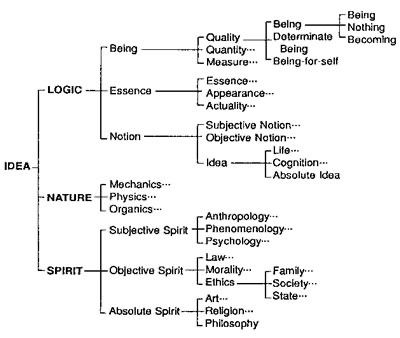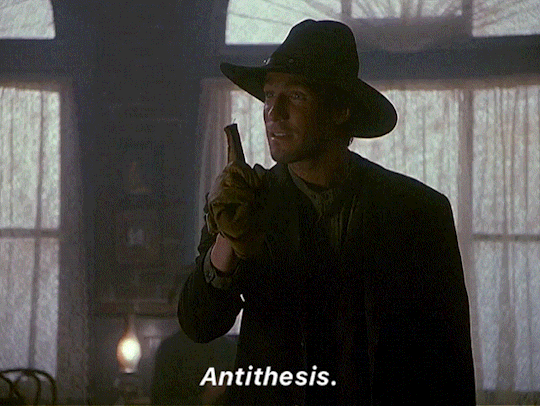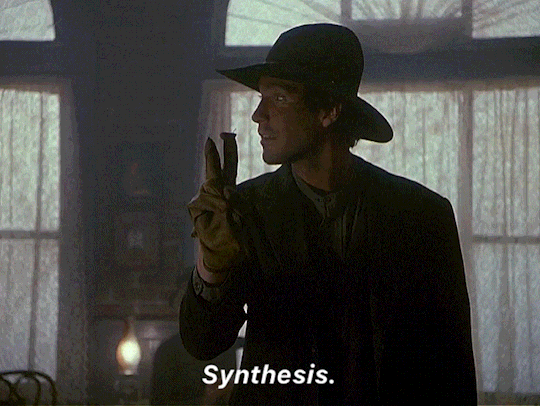#hegelian dialectic
Explore tagged Tumblr posts
Text

Hegel’s logic deals with the development of God's thinking, prior to the creation of the world, and is called heavenly logic. However, unlike formal logic, it does not merely deal with the formal laws of thought. Although it holds itself to be the development of God's thinking, it attempts to deal with the most universal definitions and laws of reality.
#georg wilhelm friedrich hegel#hegelianism#hegelian dialectic#hegel#philosopy#german philosophy#western philosophy#metaphysics#absolute idealism#idealism#miscellanea
961 notes
·
View notes
Note
gwf hegel
He wasn’t just “phenomenal” at Philosophy if you know what I mean…
41 notes
·
View notes
Text
Heaven's Dialectic
Support me on instagram: https://www.instagram.com/p/DFkzq3NvKui/
#Poetry#Poem#Poems#original poem#original art#painting#oil painting#love#love quotes#romantic#lovers#relationship#feelings#love language#romance#young love#longing#heavenly#miracles#salvation#hegelian dialectic#dialectical materialism#dialectic of enlightenment#adoration#intimacy#passion and desire#touch#desire#intimate#passion
9 notes
·
View notes
Text
The genealogy of feminist standpoint theory begins in Hegel’s account of the master/slave dialectic, and subsequently in Marx and, particularly, Lukacs’ development of the idea of the standpoint of the proletariat. Hegel argued that the oppressed slave can eventually reach a state of freedom of consciousness as a result of her/his realization of self-consciousness through struggles against the master, and via involvement through physical labor in projects that enable her/him to fashion the world—to affect it in various ways. Hegel’s analysis of the struggle inherent in the master/slave relationship gave rise to the insight that oppression and injustice are better analyzed and understood from the point of view of the slave than from that of the master. Marx and Engels, and, later, Lukacs developed this Hegelian idea within the framework of the dialectic of class consciousness, thereby giving rise to the notion of a standpoint of the proletariat (the producers of capital) as an epistemic position that, it was argued, provided a superior starting point for understanding and eventually changing the world than that of the controllers and owners of capital. The Hegelian and Marxist traditions, then, provide the genesis of standpoint theorists’ claim that the ‘double vision’ afforded to those who experience social relations from a position of marginality can, under certain circumstances, offer them epistemic advantage. Although their genealogy begins in the Hegelian and Marxist traditions, some current feminist standpoint theories are also located squarely within an empiricist tradition in epistemology. These feminist epistemologies extend the traditional empiricist commitment to experience and observation as the starting points for knowledge. Following Quine and his successors, they recognize and acknowledge that observation is theory-laden and that those theories themselves are artifacts of our making. They also draw on the insight that a set of observation-based data can serve as equally credible evidence for more than one of those theories.
8 notes
·
View notes
Text
Wickedness also resides in the gaze that perceives itself as innocent and surrounded by wickedness.
Georg Wilhelm Friedrich Hegel, Source Unlisted.
#philosophy tumblr#philoblr#german philology#philosopher#hegel#dialectics#hegelian dialectic#problem of evil#metaphysics#conuintio oppositorun#phenomenology#meta ethics#existentialism#dark academia#life quotes
91 notes
·
View notes
Text

#amazon prime#hegel#hegelian dialectic#kant#immanuel kant#philosophy#philosophy memes#porch thieves#funny stuff#book haul#philosophy books#packages#mailed
2 notes
·
View notes
Text
felsefeyi içselleştirmek için, ihtiyaca duyulan özlem ortadan kalkmış, zihnin, güçlü bir yükselişi ve içsel dayanıklılığı ortaya çıkmış, tutkular boyunduruk altına alınmış ve bilinç bu noktaya dek ilerlemiş olmalıdır.
hegel - felsefe tarihi
#kitap#edebiyat#blogger#felsefe#kitaplar#blog#kitap kurdu#friedrich nietzsche#platon#georg wilhelm friedrich hegel#hegel#hegelian dialectic#karl marks#karl marx#friedrich engels#doğanın ditalektiği#marxism leninism#vladimir lenin#christopher caudwell#sokrates#sokratik felsefe#kriton#menon#gorgias#antik yunan felsefesş#antik yunan#umberto eco#alain de botton#jean paul sartre#martin heidegger
2 notes
·
View notes
Text

#philosophy#thesis#immanuel kant#friedrich nietzsche#hegel#georg wilhelm friedrich hegel#hegelian dialectic
2 notes
·
View notes
Text
Does anyone here know anything about Queer theory?
I'm supposed to give a presentation of the Hegelian influences in the work of Judith Butler.
I think I'm cooked! I'm toast. I'm gonna get a bad yelp review. I'm not a scholar; I'm literally just a weirdo with a library card!
#judith butler#georg wilhelm friedrich hegel#hegelian dialectic#hegel#graduate school#grad school#gradblr#queer theory
4 notes
·
View notes
Text



I'm gonna recite the three parts of the Hegelian dialectic…
NORTHERN EXPOSURE 3.23 Cicely
#cicely#nx 3x23#northern exposure#doctor en alaska#ausgerechnet alaska#hegelian dialectic#kit#john corbett
28 notes
·
View notes





